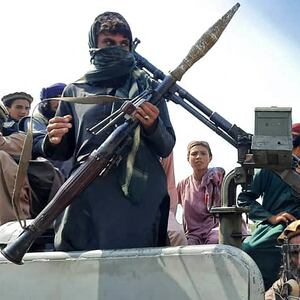The United States’ withdrawal from Afghanistan, on August 30, 2021, was one of the first major blunders of Joe Biden’s administration, and the calamitous fallout from that departure is depicted in up-close-and-personal detail by Hollywoodgate.
Egyptian filmmaker Ibrahim Nash’at’s illuminating and distressing documentary (July 19, in theaters) offers an insider’s peek at the first year of Taliban rule from the perspective of two of the organization’s leaders. What it paints is a damning portrait of the terrorist group as equally bloodthirsty and primitive, ill equipped for the modern world and yet now left with the resources to become more educated, formidable and deadly—both with regards to their own people and their foreign adversaries.
Nash’at visited Kabul just days after the final U.S. soldier left the country, armed with only a camera and his Afghan translator. “I came to see in whose hands this country was left,” he muses upon his arrival. The answer is a collection of combatants who appear unprepared for the task before them. Though he’s been allowed to film so long as he presents what the Taliban wants the world to see, Nash’at’s intentions aren’t propagandistic, as evidenced by the eerie music that accompanies footage of his drive through Kabul air base.
The remainder of Hollywoodgate is similarly despairing and caustic, and it’s also charged with tension, since multiple Taliban soldiers express distrust and disdain toward the filmmaker—epitomized by one individual remarking, “I don’t like journalists. They are always connected to some country’s intelligence.”
Late 2021 is a crucial moment in which the Taliban seeks to transition from an insurgent movement into a military regime, and a good deal of that responsibility falls to Nash’at’s two subjects. The first is Mawlwai Mansour, the newly appointed commander of the air force, who spends a lot of time in Hollywoodgate—its title a reference to the names given to these abandoned bases by the U.S.—inspecting the contents of forsaken warehouses. “The Americans left us an enormous treasure,” he opines as they sift through refrigerators stocked with beer and liquor, crates full of Chapstick and medicine, and hangars populated by dismantled helicopters. This is certainly true, although at outset, it’s clear that Mansour and his compatriots can barely identify most of what they’re finding, much less put it to effective use.
The Taliban’s ignorance is typified by a trip to a modern gym where they marvel at the treadmills and Stairmasters, as well as an early scene in which Mansour, sitting at his desk going over military expenses, fails to correctly multiply 67 by 100—as do his underlings. That a man like this is in charge of the country’s air force is an indication of the Taliban’s lack of sophistication.
That impression is furthered by Hollywoodgate’s focus on its other protagonist, lieutenant M.J. Mukhtar, who after enjoying some target practice with an American machine gun (which is lighter and more accurate than a Russian Kalashnikov) shows Nash’at the cave where he used to hide with a lone blanket and weapon. Mukhtar says that in this hideout, they never used any light “so the Jews wouldn’t detect us. Hey Jews, you lost your war!”
Mukhtar’s hateful conflation of antisemitism and anti-Americanism goes hand in hand with his later discussion about the need for women to remain fully covered at all times—a requirement he justifies via an anecdote about chocolate that’s so moronic, even his acolytes respond with blank stares. Unsurprisingly considering the Taliban’s belief in sharia law, women are rarely seen in Hollywoodgate, save for a few shrouded adults who beg outside a mosque and a couple of young children running and playing in the sunshiny desert.
Happiness abounds in Nash’at’s film. However, it’s primarily of a grim sort predicated on oppression, intolerance, and violence, such that Mansour and Mukhtar’s smiles are laced with the same callousness that defines their stone-faced countenances. Whether interviewing ex-government pilots to join the air force or planning a nighttime mission to capture and interrogate enemies, the duo prove the embodiment of banal, brutal fanaticism.
In shots of Taliban soldiers decked out in American tactical gear, as well as the sight of Mukhtar rehearsing a siege (complete with him starting things off with “Action!”), Hollywoodgate suggests that the Taliban are engaged in an elaborate role-playing performance for which they’re unqualified. Nonetheless, Mansour and Mukhtar are convinced that they can flourish courtesy of American technology, with the latter proclaiming that these tools will allow the group to “rule the world, and our flag will stand tall,” and the former putting his mechanics to work so they can fly U.S. aircraft at the big one-year anniversary celebration of the country’s liberation. They’re amateurs determined to become experts, and if it seems like that process will take some time, it’s apparent that the Taliban are a patient and dedicated lot.
A closing text card relays that more than $7.2 billion worth of American military equipment was left behind in Afghanistan, and while not all of it is operational, the threat of this situation is impossible to miss, especially given the Taliban’s warlike nature.
“The burning desire in my heart is to see American troops still here, so that I could set an ambush right here with my machine gun and have it loaded with 500 bullets. I keep shooting, shooting, shooting until my heart is satisfied. And then at the end, I become a martyr,” says Mukhtar.
Similar dreams fuel Mansour, who doesn’t just oversee the air force’s efforts to repurpose American detritus into usable instruments of destruction, but manages a growing fight with Tajikistan. Telling that country’s minister of defense that “you have gone too far” by harboring Taliban enemies, and that they will now do likewise, it's stark evidence that the regime knows only conflict and, thus, will continue to seek it out wherever possible.
"Inside all the gates I went through, one thing I cannot move past is the obscene power of those who worship war, and the pain that it causes for generations,” muses Nash’at at the conclusion of Hollywoodgate. The startling material he captures intimates that, at least for the foreseeable future in Afghanistan, there’s much more pain to come.








